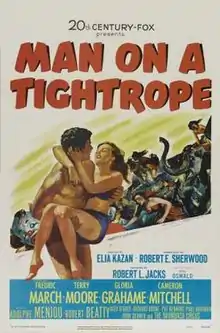Man on a Tightrope
Man on a Tightrope is a 1953 American film noir directed by Elia Kazan, starring Fredric March and Terry Moore and Gloria Grahame. It was entered into the 3rd Berlin International Film Festival.[2] The screenplay by Robert E. Sherwood was based on a 1952 novel of the same title by Neil Paterson. Paterson based his true story, which first appeared as the magazine novelette International Incident, on the escape of the Circus Brumbach from East Germany in 1950. Members of the Circus Brumbach appeared in the film version in both character roles and as extras.
| Man on a Tightrope | |
|---|---|
 Theatrical poster | |
| Directed by | Elia Kazan |
| Screenplay by | Robert E. Sherwood |
| Based on | Man on a Tightrope: The Short Novel (1953) by Neil Paterson |
| Starring | Fredric March Terry Moore Gloria Grahame Paul Hartman Richard Boone Cameron Mitchell Adolphe Menjou |
| Music by | Franz Waxman |
| Cinematography | Georg Krause |
| Edited by | Dorothy Spencer |
| Distributed by | Twentieth Century-Fox Film Corporation |
Release date |
|
Running time | 105 minutes |
| Country | United States |
| Language | English |
| Budget | $1.2 million[1] |
Plot
In 1952 Czechoslovakia, circus man Karel Cernik struggles to keep his beloved Cirkus Cernik together, which belonged to his family before being nationalized by the Communist government. The government allows Cernik to manage the circus, but he grapples with deteriorating conditions in the circus, loss of his workers to the state, and tension with his willful daughter Tereza, and his young second wife Zama, whom everyone suspects of being unfaithful. Cernik wants to end a budding romance between Tereza and roustabout Joe Vosdek, who has been with the circus for only a year.
Cernik is interrogated at the headquarters of the S.N.B. state security in Pilzen on why he is not performing the Marxist propaganda acts dictated by the government. Cernik explains that the skits were not funny, and that audiences prefer his usual act. The S.N.B. chief orders him to resume the required act, and to dismiss a longtime trouper who calls herself "The Duchess". Propaganda minister Fesker casually asks him about a radio in his trailer, alerting Cernik to a spy in his midst. Cernik is fined and released, although Fesker believes that he is a threat to the state.
Cernik, inspired by a recent spate of escapes from behind the Iron Curtain, has decided to escape over the border to Bavaria. Cernik suspects that Joe is the spy, but unknown to him, Tereza has learned that Joe is actually a deserter from the American Army who is planning an escape attempt of his own. Cernik's longtime rival Barovik visits and reveals that he knows of the escape plan. Barovik assures Cernik that because they are both circus men, that he will not betray him. Cernik agrees to leave behind most of his equipment for Barovik. Realizing that he must act swiftly, Cernik discovers that Krofta, who has worked for Cernik for twenty years, is actually the spy. Cernik ties up Krofta but is confronted by Fesker about a travel permit, which he issues to catch Cernik in the act of trying to escape. Fesker is about to pursue the circus when he is arrested by a commissar sergeant for issuing the travel permit.
Joe reveals himself to Cernik, who incorporates him into the plan. At the border crossing, Krofta escapes, but is stopped by Cernik from warning the border guards. In the fracas Krofta mortally wounds him. Using an audacious and violent dash across the only bridge, most of the circus safely escape only to be told that Cernik has paid with his life. Obeying his dying wish, Zama orders the troupe to march on to their next performance.
Cast
- Fredric March as Karel Cernik
- Terry Moore as Tereza Cernik
- Gloria Grahame as Zama Cernik
- Cameron Mitchell as Joe Vosdek
- Adolphe Menjou as Fesker
- Robert Beatty as Barovic
- Alexander D'Arcy as Rudolph
- Richard Boone as Krofta
- Pat Henning as Konradin
- Paul Hartman as Jaromir
- John Dehner as the SNB chief
Production
Shot on location in Bavaria, West Germany, authentic acts were used, and the entire Circus Brumbach was employed for the production.[3] The original plot to escape in small increments across the border was the actual means used by the Circus Brumbach in their escape.
References
- Solomon, Aubrey. Twentieth Century Fox: A Corporate and Financial History (The Scarecrow Filmmakers Series). Lanham, Maryland: Scarecrow Press, 1989. ISBN 978-0-8108-4244-1. p248
- "1st Berlin International Film Festival: In Competition". berlinale.de. Archived from the original on 2010-02-02. Retrieved 2009-12-22.
- Elia Kazan: A Life – Page 477
External links
- Man on a Tightrope at IMDb
- Man on a Tightrope at the TCM Movie Database
- Man on a Tightrope at AllMovie
- Man on a Tightrope at the American Film Institute Catalog
- A.W. "Man on a Tightrope (1953)", New York Times film review, June 5, 1953